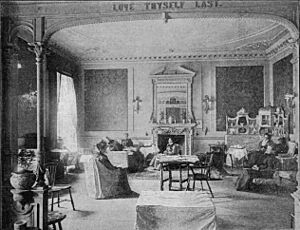Pioneer Club (women's club) facts for kids
The Pioneer Club was a special club for women started in London, England, in 1892. It was founded by Emily Massingberd, a social worker who cared about helping people and promoting temperance (avoiding alcohol).
This club was known for new ideas and ways of thinking in the late 1800s. Members were interested in topics like theosophy (a spiritual philosophy), anti-vivisection (being against animal testing), anti-vaccination (being against vaccines), and especially feminism (the idea that women should have equal rights and opportunities as men).
Contents
Why the Name Pioneer Club?
The club got its name from a famous poem by Walt Whitman called 'Pioneers! O Pioneers!'. Some lines from this poem were even written on a glass screen inside the club's hall:
We the route for travel clearing
Pioneers, O Pioneers!
All the hands of comrades clasping
Pioneers, O Pioneers!
These lines show the club's spirit of being brave and leading the way for new ideas, just like pioneers exploring new lands.
Where Was the Club Located?
The Pioneer Club quickly became one of the most popular women's clubs in London. By 1895, it had more than 300 members! It first started on Regent Street, then moved to 22 Cork Street. Its main home became 22 Bruton Street, in an area called Berkeley Square. This building used to be the home of a lord.
What Was Inside the Club?
The club building was quite large. It had three drawing rooms (like living rooms), four bedrooms, and a library filled with books. Members and their guests could also eat meals there.
Every Thursday evening, the club held lectures, debates, and discussions. These talks covered many different topics, including social issues, politics, and literature.
Who Could Join the Pioneer Club?
Many different women joined the club, including those who worked in professions and other jobs. Typists, dressmakers, and milliners (people who make hats) were all members.
To show that everyone was equal, no matter their social standing, members were called by a number instead of their name. For example, "99 might be a Duchess or a Post Office clerk." This meant that whether you were rich or had a regular job, you were treated the same inside the club.
On Wednesdays, the club held "At Homes" events, where men were also invited to visit.
Changes After the Founder's Death
Sadly, Emily Massingberd, the club's founder, passed away early in January 1897. After her death, some people felt that the club's focus on women's rights became less strong.
In 1897, the club was supposed to move to a new location at 15 Grosvenor Crescent. However, after Massingberd's death, some members decided to stay at the old location. The new place became known as the Grosvenor Crescent Club. By 1900, this new club was described as being "purely social," meaning it was more about fun and less about serious discussions or women's rights.
 | Lonnie Johnson |
 | Granville Woods |
 | Lewis Howard Latimer |
 | James West |


